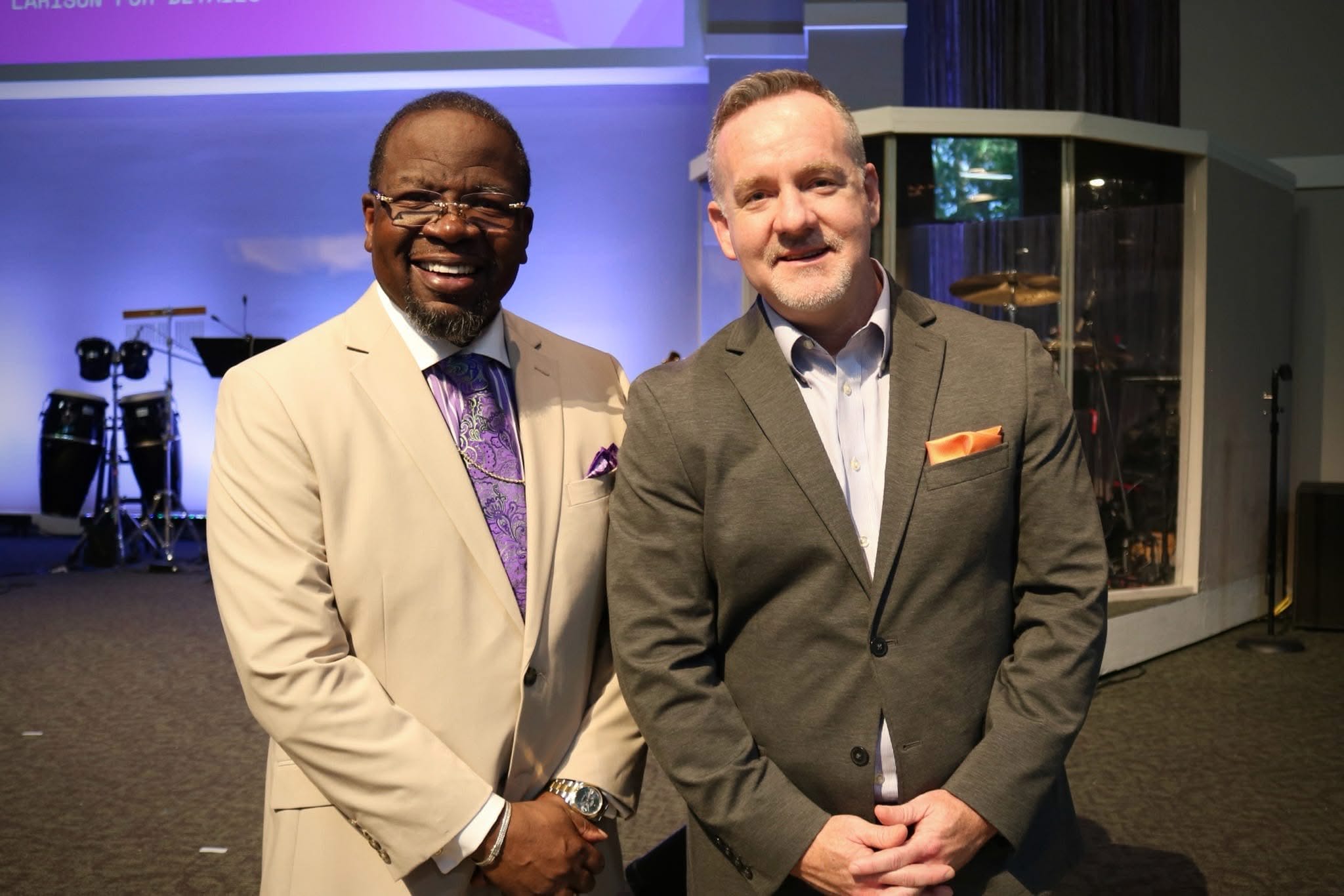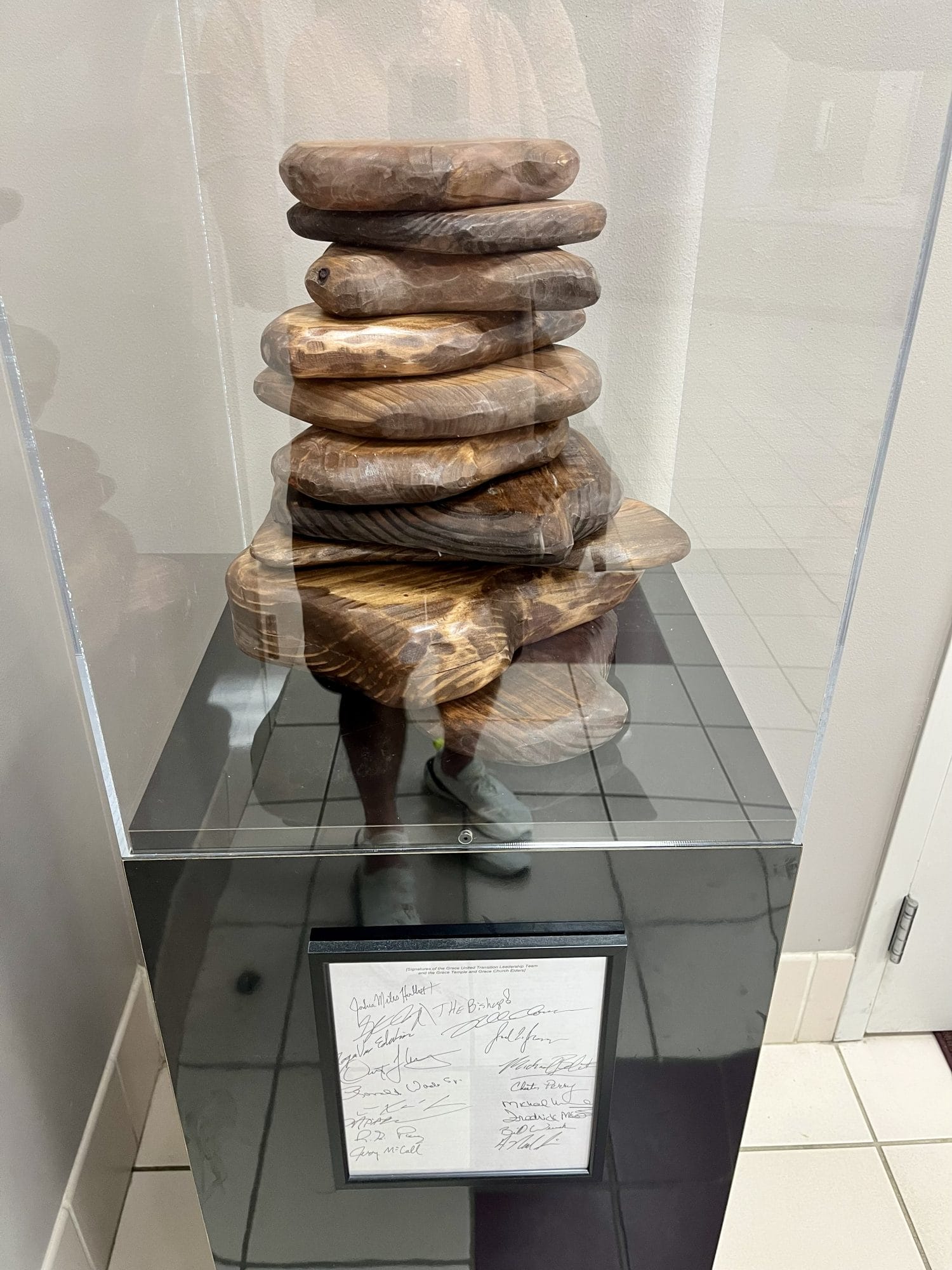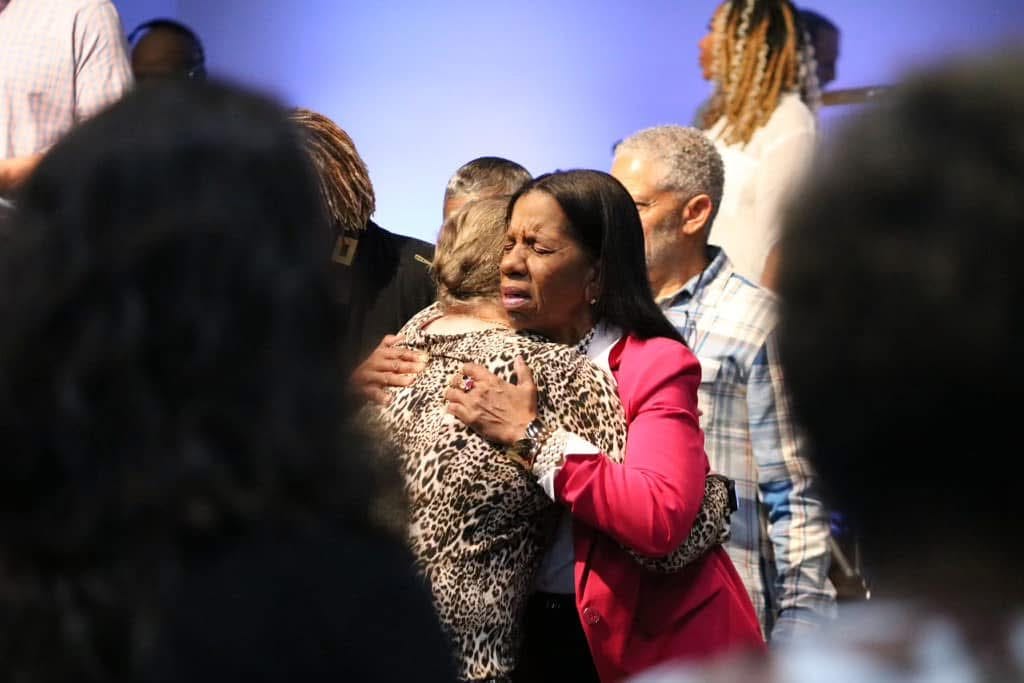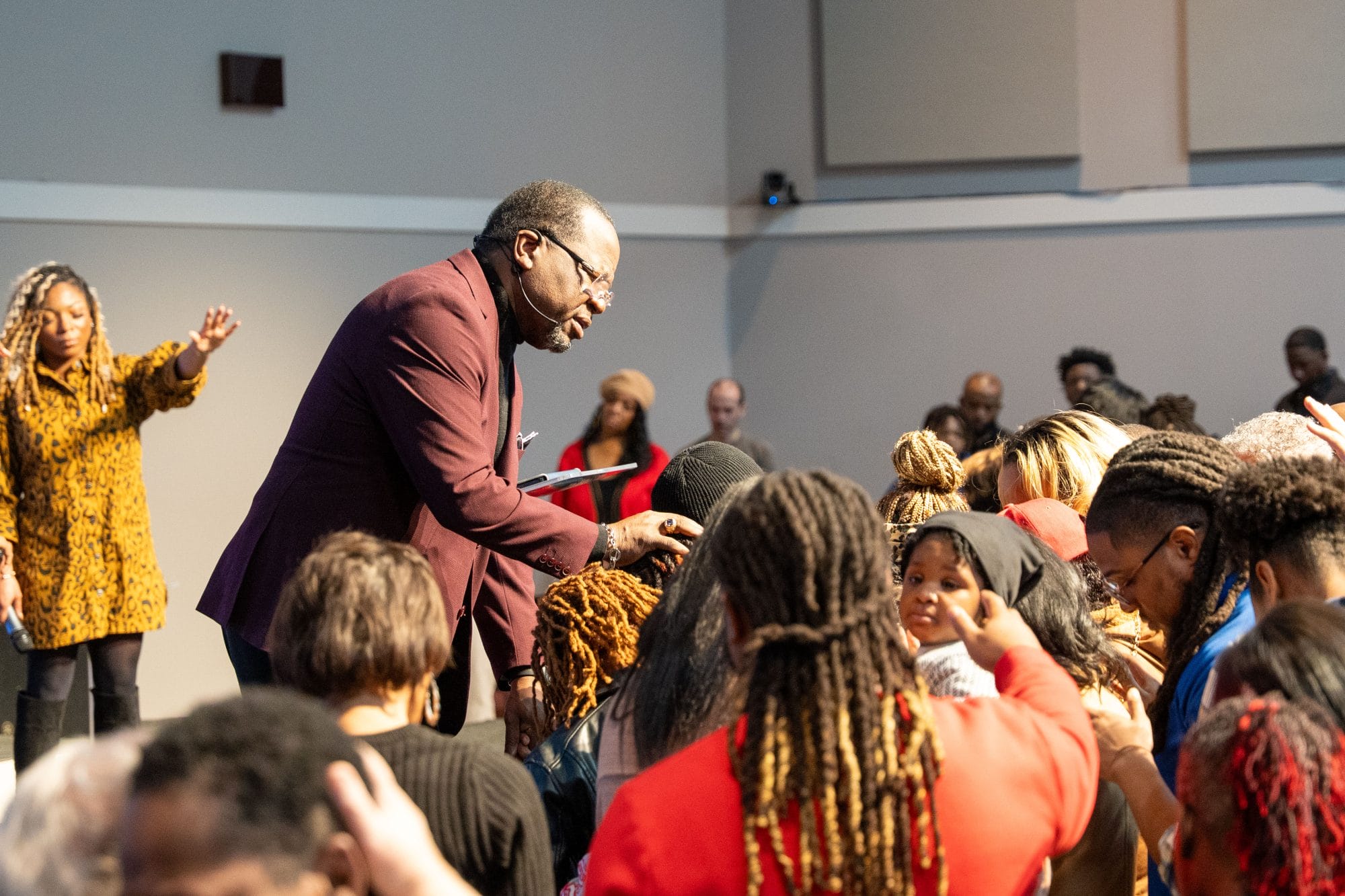When Two Become One
Joshua Hurlburt dreamed of pastoring a multi-ethnic church. Bishop Steven Arnold was looking for a place for his church to meet.
Neither pastor knew the other existed until one phone call became the answer to their prayers.
In 2014, Joshua became the lead pastor at Grace Church in Little Rock. “When leadership handed me the church, they said, ‘You can do whatever you want to with it,’ because the church was struggling,” Joshua says. “The ship was burning, and I had to fix the ship.” After two years working to get the church in a better place, Joshua began thinking, “What’s next?”
“I grew up on the not-wealthy side of Memphis,” Joshua says. “I was a minority in my middle school. When someone from a different race and I passed each other, you could just cut the racial tension with a knife. I went to a giant, all-white megachurch, and just because of my upbringing, I thought, “It shouldn’t be like this.’”

Joshua wanted Grace Church to be multi-ethnic—but making that a reality was harder than he expected. “We hired an African-American worship pastor, Jessica Garrett. She did a great job, and to this day, I call her a hero. Then we hired an African-American youth leader, but it just never caught,” he says. “I was doing the best I could, but it was exhausting for all of us. It was just a slog.”
Discouraged, he looked to God for answers. “I prayed, ‘Lord, I feel like you called me to do something, but I’m struggling.’” He waited for a response. When it came, it was loud and clear. “God told me, ‘I want you to pray that I will bring an African-American congregation to move into your building. I’ll make you a multi-ethnic church. But I don’t want you to tell anybody about it. Not your wife. Not the elders. Keep it a secret, so that when that happens, you’ll know it’s from me.’”
At Grace Temple, Bishop Arnold was also asking God for answers. “We were coming out of the pandemic and looking for a location to meet. I reached out to a mutual friend to see if he knew of anyone who was willing to share a space,” he says. As it turned out, Joshua was with this mutual friend when Bishop Arnold called. “I put that call in. Brock called me back and said, ‘You need to call Joshua. He’s open,’” Bishop Arnold says.
When they met two days later, Joshua told Bishop Arnold, “I hesitate to say this, but I’ve been praying for a while, and I know why you’re here. You don’t know why you’re here, but I know why you’re here.” Bishop Arnold was impressed. “I’m a big faith person, and what blessed me was that he told me, ‘I know why you’re here,’” he says.
Two Churches, One Building
What began as a simple meeting quickly became something more for two pastors from two very different churches.
“We start talking about the possibilities,” Bishop Arnold says. “My suggestion was, ‘Let’s start doing some things.’ I refer to it as the dating period. Let’s get to know each other because not only are we dealing with two different cultures, we’re dealing with two different, almost belief systems. I’m Pentecostal and Joshua’s a long way from Pentecostal.”
At first, Grace Temple just leased space from Grace Church. “Our service was at one time, and their service was at another,” Bishop Arnold says. “There was kind of this separation—two churches in one building.” Over time, they agreed to worship together every fifth Sunday. “It was going so well. We moved from fifth Sundays to every fourth Sunday, basically as one church. We really got serious about praying about a merger.”
“We came from two different cultures. So, there were adjustments,” he says. “But at the same time, we’d run into little roadblocks, but we would knock ‘em down and just keep going. Just like a couple from two different backgrounds dating.”
The more they worshiped together, the more both congregations pushed for a merger.
“A lot of times, as a leader, you’re pushing something that you think is important, and people aren’t responding. This was the other way around,” Joshua says. “They’re saying, ‘Can we wrap this up and make this happen?’ But we’re telling them, ‘Let’s make lots of decisions and get there before we pull the trigger.’”
“We have literally prayed to figure it out as we go,” Bishop Arnold says. “We built the leadership, constitution, and bylaws as we went. The church came together as one church before we had everything else in place.” “We were painting the boat as we floated,” Joshua says. “We put it out to sea and then fixed things.”
Walking Forward Together
“If you go downstairs, there’s a case with some stones in it,” Joshua says. “In the Old Testament, when parties agreed that they were heading in the same direction, they would make a monument out of stones. Before we merged, we knew the Lord was in it and wanted us to move forward together. We had a ceremony and laid the stones. We said, ‘We are going to start walking forward together and figuring it out, and we are committing to one another at this point, even though we haven’t merged.’”

“I refer to that ceremony as the engagement ceremony,” Bishop Arnold says. “What was significant about that? It was great that the leaders came up on the stage. They had someone from their congregation to speak, and we had someone from our congregation speak, one of our older ladies. Now, in our culture, the pastors are put in very high regard. She said, ‘In time past, I’ve had one pastor, and if someone came after him, they had to deal with me. Moving forward, I’ve got three. And if someone deals with them, they have to deal with me.’”
First, they met. Then they dated. Eventually, they got engaged. After a year and a half, Grace Temple and Grace Church married to become Grace United.
Many churches would love to build a multi-ethnic church. But few realize the challenges that come with it. “People ask all the time, ‘How’s it going?’” Joshua says. “It’s both the most exciting thing I’ve ever done in ministry and the hardest thing I’ve ever done in ministry.”
Life Together
Making the merger official was one thing. Grace United now had to learn to live as one family, bringing different cultures, traditions, and expectations under one roof.
It didn’t take long for differences to show up.
One of the first differences surfaced in worship. “Obviously, worship styles are different,” Joshua says. “If you listen to a standard white Christian radio station, a lot of the songs are like this: ‘Lord, I’m struggling.’ ‘Lord, I’m doubting.’ ‘Lord, my time is hard. Be with me.’ If you listen to a gospel station, you hear about victory. ‘I’m overcoming.’ ‘I can because God is with me.’”

When two cultures come together, there are plenty of teachable moments. “It is language. It is tradition. It is what people have done all of their lives without even thinking,” Bishop Arnold says. “Case in point—church anniversary. They had never had a church anniversary. That’s a big thing in the African-American church community. Years ago, our foreparents on plantations had to get permission to have church. Whenever they were really at liberty to have church, that was a point of celebration. If you’ve had church now for a whole year, this is another time to celebrate.”
Both pastors have learned to celebrate their differences, including preaching styles. “We haven’t changed the way we preach,” Joshua says. “We’re not trying to build some weird middle church where no one understands. It was very important for us to keep the important elements of both cultures. When Bishop preaches, it’s a very different style from my exegetical preaching. I’m a teacher preacher, he’s a preacher teacher.”
For Grace United, this isn’t something they could figure out on paper. It has to be done in real time with real people. “You just have to have a long humility in this process,” Joshua says. “There’s no book on how to do this.”
The Next Generation
For all the challenges, Bishop Arnold and Joshua see plenty to celebrate, especially among the next generation. “As a 65-year-old African-American, my attention turns to the younger generation. That’s where my mindset is. ‘Lord, allow us to build something that outlives us.’ I’ve got nine grandchildren, and the youngest is one. With what God is doing here, I have my granddaughter in mind because she is being raised in a different society. I was raised in a very segregated society. That’s not going to be her story,” Bishop Arnold says.
“We have young adults here. I refer to them as my ‘sons’ and ‘daughters.’ They refer to me as ‘Pops’ or ‘Dad’ because I’ve raised them,” he says. “This church is designed for them because they have white friends and groups they are a part of. So, they feel right at home in this environment. To me, that’s a touchdown, and those are the things that motivate me. I am just as passionate about this today as I was 40-some years ago when I got started.”
Joshua sees a church like theirs being the standard, not the exception, in the future. “Barna surveys reveal that multi-ethnic churches are growing and mono-ethnic churches are dying. What we’re doing here will be the norm in 20 years. Younger generations are just not going to have the patience for church being the only place in their life that isn’t diverse.”

It Takes All of Us
Grace United isn’t the first multi-ethnic church in Central Arkansas. Churches like Fellowship North and Mosaic came before them. Joshua credits leaders like Harold Nash (Fellowship North) and Harry Li (Mosaic) for helping them navigate the journey.
Still, each church has its own story and purpose. That’s the beauty of the Church—different expressions, one body.
“The Lord has given us all different gifts. We bring those together for the good of the Church. I extend that to churches,” Joshua says. “All churches aren’t supposed to be the same. Our church isn’t supposed to be Mosaic, and Mosaic isn’t supposed to be Fellowship North. We do different things, and that’s okay—as long as we’re doing what the Lord wants us to do.”
We are grateful for the exceptional work of Grace United and other churches in our cities pursuing unity alongside diversity. They are helping the whole Church grow.
Speaking the truth in love, we will grow to become in every respect the mature body of him who is the head, that is, Christ. From him, the whole body, joined and held together by every supporting ligament, grows and builds itself up in love, as each part does its work.
Ephesians 4:15-16


